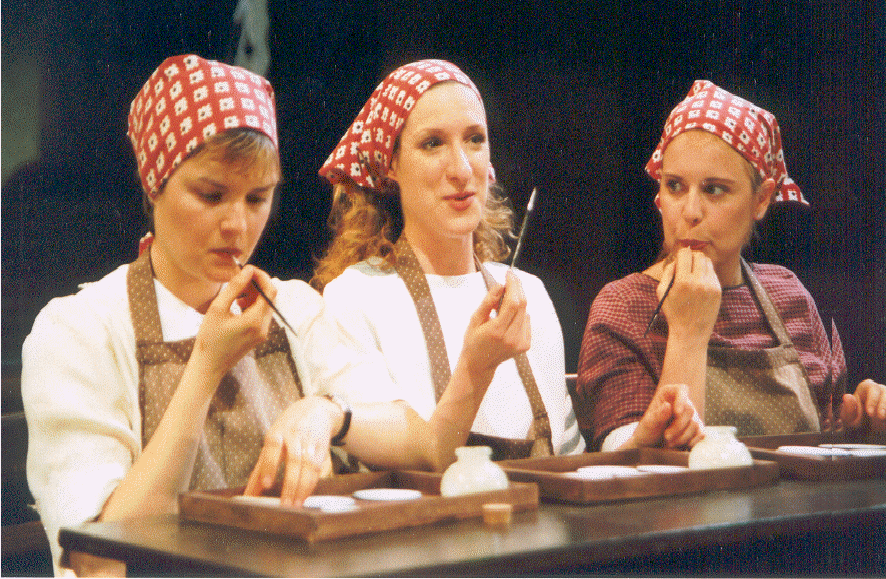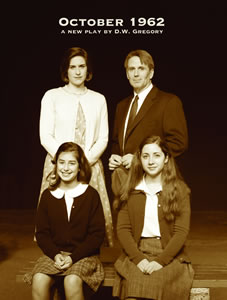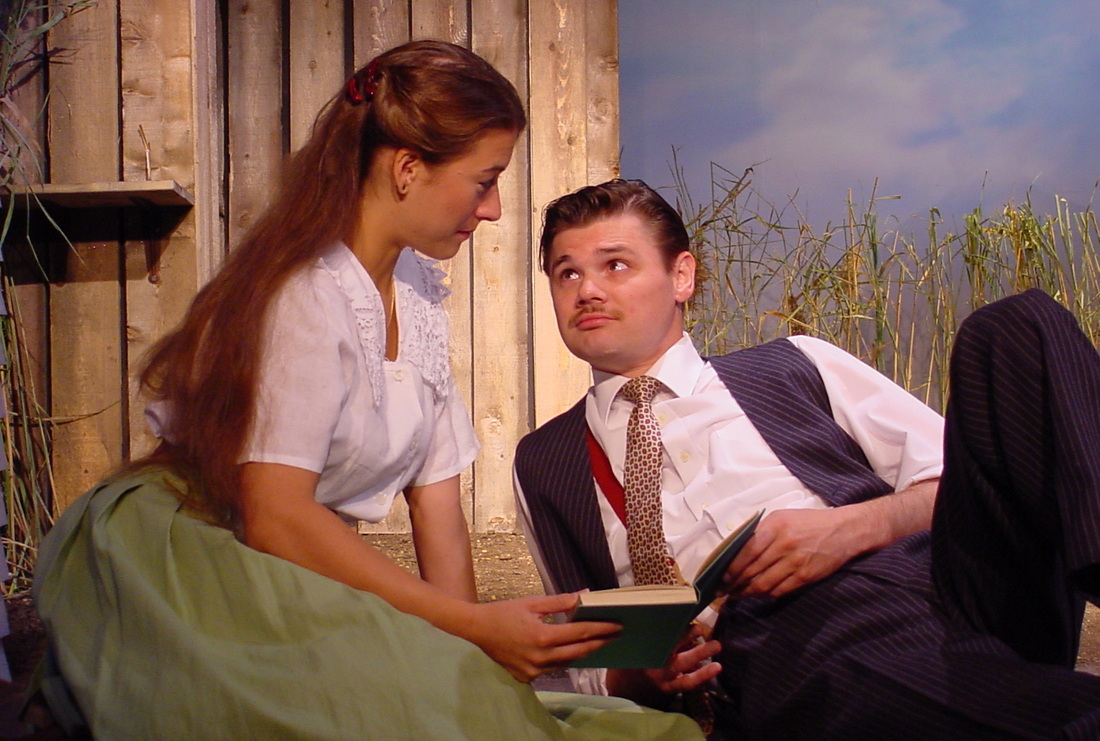|
Jacqueline Lawton: How long have you lived and worked as a playwright in DC? What brought you here? Why have you stayed?
D.W. Gregory: I have lived in the D.C. area for about 20 years now, coming here in the early 90s with my then-husband, who was offered a job at USA Today. After we separated I stayed on to complete an MFA program at Catholic University. Except for a year residency at a New Jersey theatre, I have been here ever since. JL: Have you ever been a member of a DC area playwrights writing group? If so, did you find it useful? Would you recommend that other playwrights join them? DWG: I'm a former member of Woolly's Playground, now defunct, and I am a founding member of the Playwrights Gymnasium, a process-oriented playwrights' workshop. Our focus in the gym is on development of craft through directed exercises. I started it in 2004 with Paul Donnelly. We were both tired of workshops that involved bringing in 20 pages for critique. That kind of approach can motivate you to write, but I think it has its limits, particularly if the discussion is not well moderated. We wanted a format that would force us to break out of our comfort zones and take a more dispassionate approach to our work, to identify weaknesses in our writing and fight past any impulse to take a critique personally. So exercises and writing prompts seemed to help make that happen. JL: In DC, we have the Capital Fringe Festival, the Intersections Festival, the Source Theatre Festival, the Kennedy Center's Page-to-Stage Festival, the Black Theater Festival, and the Hip Hop Theatre Festival. We also have the Mead Lab at Flashpoint Theater Lab Program. Have you participated in any of these? If so, can you speak about your experience? DWG: Early on, the gym produced an evening of short plays in the first Capital Fringe Festival -- though it was a sellout show--we actually made money---in my opinion it was not a particularly good showcase for our work. Just a lot of things went wrong and we were not really ready to put it up, but we did anyway, and after that I decided that if I produced again I would focus only on one play at a time and that it would be mine! So the next project I did was a fringe show in Philadelphia that did very well -- critically and financially. It was named a "show you can't miss" by Philadelphia Weekly and I went on to develop it into a full-length, which is now slated for three productions in 2012-13. The Philadelphia Fringe is a harder festival to work with because you have to find your own venue and they offer a lot less support than the Capital Fringe. But both festivals are real frenzies of production, and cutting through the clutter and attracting an audience is a tough job. JL: What kind of work do you do to pay the bills? How do you balance this work with your writing? DWG: I'm a reporter for Bloomberg -- by day I write about tax policy, by night I fantasize about having time to write other things. My writing/work balance is pretty damn poor, so I end up being a binge writer -- I start a play and the only way to finish it is to work round the clock like an insane woman for a month or two at a time, then take a month off and clean the house. JL: How many plays have you had produced in the DC area? Were any of these plays self-produced? If so, where and what did you learn from that experience? DWG: See above. My productions in D.C. have been scant, largely limited to 10-minute plays and the thesis play I produced at Catholic U. I did work with Imagination Stage for a couple of years writing original plays for their acting students -- two of which went on to be published and receive productions around the country. Most of my work though is produced outside of D.C. I am a resident playwright at NJ Rep, an Equity theatre in Monmouth County, NJ. They've produced two of my world premieres and I am working on another project for them. JL: If you could be produced at any theatre in DC, which would it be and why? DWG: Need you ask? I'd love to see something go up at Theatre J just because Ari is such a gutsy producer and it would be fanastic to work with him. Most of my stuff, in my opinion is rather deceptive. It seems like safe suburban fare, but it's a lot more challenging and it is, at bottom, kind of subversive. You get past the exterior package and dig in and you discover its posing some unsettling questions. For that reaosn, I think a lot of my work would do really well at Round House. I have some large ensemble pieces that would be suitable for Forum Theatre. And of course, who would not fantasize about a production--of anything--at Arena Stage? JL: DC audiences are ... DWG: Rather conservative, as a whole. There is so much competition for their time and attention -- and I don't think audiences here are especially adventurous -- though perhaps that is changing. JL: DC actors, designers and directors are .. DWG: As good as you'll find anywhere. New York, Chicago -- they don't really have the edge on DC when it comes to talent -- but they do have money. JL: DC critics are ... DWG: Hard to categorize ... I think Peter Marks is the real deal -- a critic whose work overall will enlighten you. A lot of people write reviews, but how many of them are real critics, who can put a work in context and evaluate it from a strong basis of understanding? That's Peter, for sure. And Nelson Pressley, who in my opinion is a pretty generous critic; I think he makes a real effort to be supportive of smaller companies. Really what a lot of artists need is attention -- and a good critic can do an immense service simply by shining a light on a new or emerging company. JL: How do you feel the DC theatre community has addressed the issues of race and gender parity ? How has this particular issue impacted you and your ability to get your work produced on the main stages? DWG: I have no idea, really -- my impression is that there is more attention to giving voice to African American and Latino writers than to female writers, but that's not necessarily an informed impression. I don't know that my ability to get work on stages here is in any way affected by this issue -- I can't get attention in general, so it's not peculiar to DC. JL: What advice do you have for an up and coming DC based playwright or a playwright who has just moved to D.C.? DWG: Go somewhere else. If you are just starting out, if you have a choice of where to live -- Philadelphia is a much more livable city with a lively theatre scene. Chicago has a real network of support -- including Chicago Dramatists, where you can take classes, workshops -- and the theatre scene there is vast compared to D.C. Or try Minneapolis -- a lot of new working being produced, and the Playwrights Center is an incredible resource. JL: What's next for you as a playwright? Where can we keep up with your work? DWG: I am now online at my blog, dwgregory.com/blog. You can look for updates there. In the near term -- my new drama SALVATION ROAD opens at New York University Oct. 26, followed by a production at Walden Theatre in Louisville, Ky., in November, and a production at Seton Hill University in April. And there may be an interesting development to talk about soon, though not at liberty to say at the moment.
0 Comments
Your comment will be posted after it is approved.
Leave a Reply. |
My BlogI'm a playwright, dramaturg, and teaching artist. It is here where you'll find my queries and musings on life, theater and the world. My posts advocate for diversity, inclusion, and equity in the American Theatre and updates on my own work. Please enjoy!
Categories
All
Archives
June 2020
Reading List
|



